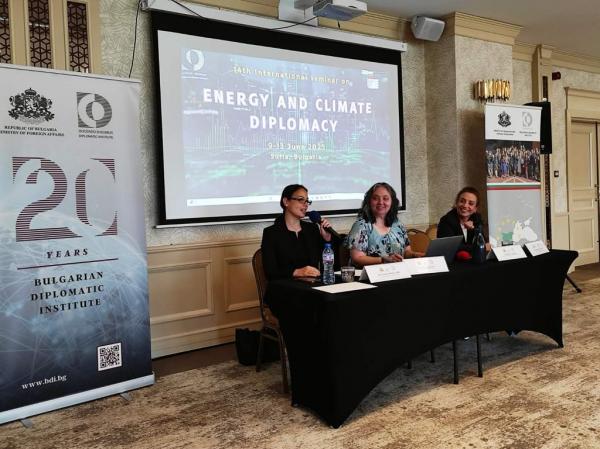13.06.2025
On June 12, 2025, Dr. Desislava Kalcheva took part in the 14th International Seminar on “Energy and Climate Diplomacy”, organized by the Diplomatic Institute at the Ministry of Foreign Affairs of the Republic of Bulgaria. Dr. Kalcheva participated in the event in her capacity as lecturer and coordinator of the master’s program “Economics and Management of Public Resources” at the Faculty of Economics and Business Administration.
She served as moderator of the panel titled “Coal Phase-Out in the EU: Keeping the Social Contract Intact Amid Energy Poverty Risks”. The panel included: Eng. Milena Agopyan – air quality expert at the Energy Agency of Plovdiv; Eng. Silvia Todorova – director of the Center for Entrepreneurship at the Bulgarian Chamber of Commerce and Industry; and Dr. Rumyana Grozeva – executive director of the Agency for Regional Economic Development in Stara Zagora.
Following the panelists’ presentations, an in-depth discussion was held on key issues related to the coal phase-out in the EU. Participants debated the feasibility of the proposed timelines and the major socio-economic challenges involved. The focus was placed on the need for a balanced transition – green, just, and socially sustainable – with the active engagement of local communities.
Other topics discussed included opportunities for retraining workers from the mining sector, successful European practices for the economic transformation of coal regions (such as renewable energy, industrial investments, and tourism), and the important role of transport as a driver of economic renewal.
It was emphasized that achieving the EU’s climate goals requires adaptation to local realities, implementation of reforms, and strong involvement of local authorities as intermediaries between institutions and affected communities. The concept of a “just transition” was highlighted as a process that ensures social support and protection for the people and regions most affected by the energy transition.
The seminar brought together 40 experts from 16 countries across the Black Sea region, Southeast Europe, the EU, and third countries. On the Bulgarian side, participants included representatives from public institutions, the business sector, and academia.
